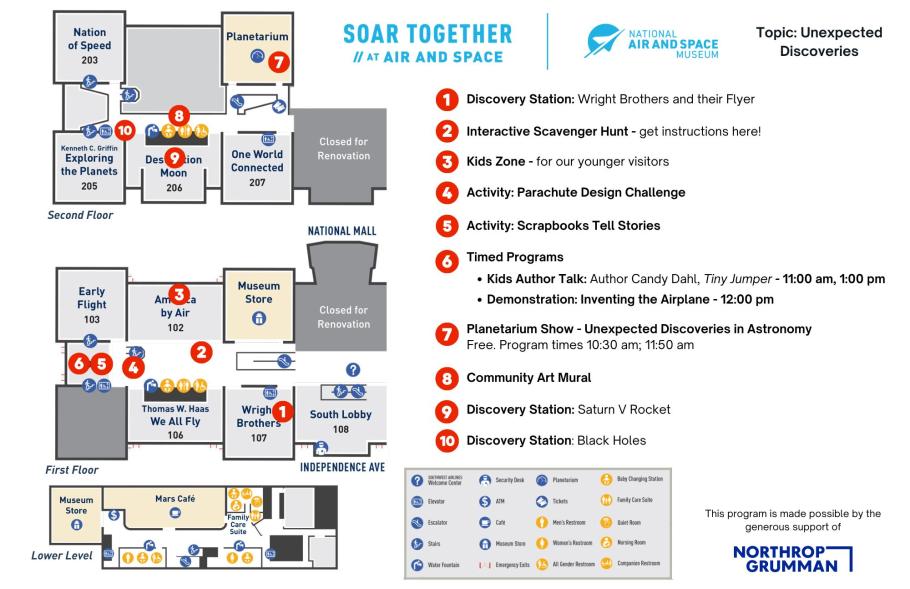Join us for an exploration of how science and discovery work, and learn how surprises, mistakes and pivots are important parts of the process.
1. Discovery Station: Wright Brothers and Their Flyer
Discover how Wilbur and Orville Wright took to the air with brains, determination, and a little inspiration from birds, boxes, and bicycles. Learn more about the Wright flyer, the first powered airplane that sustained flight and could be controlled by a pilot.
2. Interactive Scavenger Hunt
Explore museum exhibits about unexpected and surprising discoveries by doing fun missions, activities and photo challenges. Earn points with every activity you complete! Requires the Goosechase app. Game code is Z84814
3. Kids Zone - For our youngest visitors
Play with take-apart toy airplanes. Make your own whirligig and test out ways you can keep it in the air longer.
4. Activity: Parachute Design Challenge
Discoveries happen after lots of trial and error. It’s all part of how science works! Design your own parachute and try out the important process of testing it out and improving your design to meet a challenge.
5. Activity: Scrapbooks Tell Stories
One of the ways we learn about forgotten parts of aviation history is by looking at primary sources — sources that were created by people living at the time we are studying. Learn how to interpret information from a specific primary source - a scrapbook - and then make your own scrapbook page.
6. Timed Programs
Kids Author Talk: Author Candy Dahl, Tiny Jumper | 11:00 am, 1:00 pm
Listen as author Candy Dahl talks about her children’s book about the pioneer of parachuting, Tiny Broadwick. Learn about the surprising discovery she made during one fateful jump.
Demonstration: Inventing the Airplane | 12:00 pm
Learn about the events that led up to the historic moment humans first flew in an airplane in this interactive demonstration.
8. Planetarium Shows | 10:30 am, 11:50 am
Watch a free, live, guided tour of the night sky and learn about surprising discoveries in astronomy. The facilitator will answer questions from the audience!
Free tickets are available at the box office on the second floor. Please arrive ten minutes before start time for seating. Shows last approximately 25 minutes.
9. Community Art Activity
What invention or discovery would you like to see in the future? Share through words or drawings on our community art piece.
10. Discovery Station: Saturn V Rocket
Learn about the Saturn V Rocket, the science and engineering behind its design, and how it successfully brought American astronauts to the Moon.
11. Discovery Station: Black Holes
Black holes are one of the most talked-about phenomena in astronomy, but did you know the first black hole wasn't discovered until the 1960s? Explore how the gravity of large objects, such as black holes, can warp space and bend the light that we see in our telescopes.
